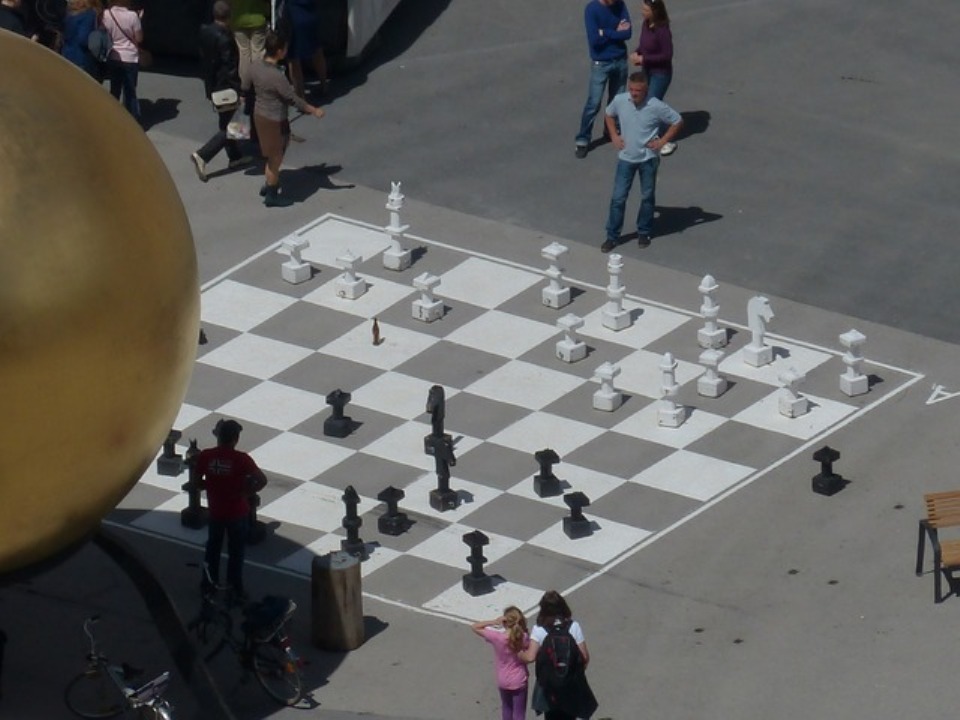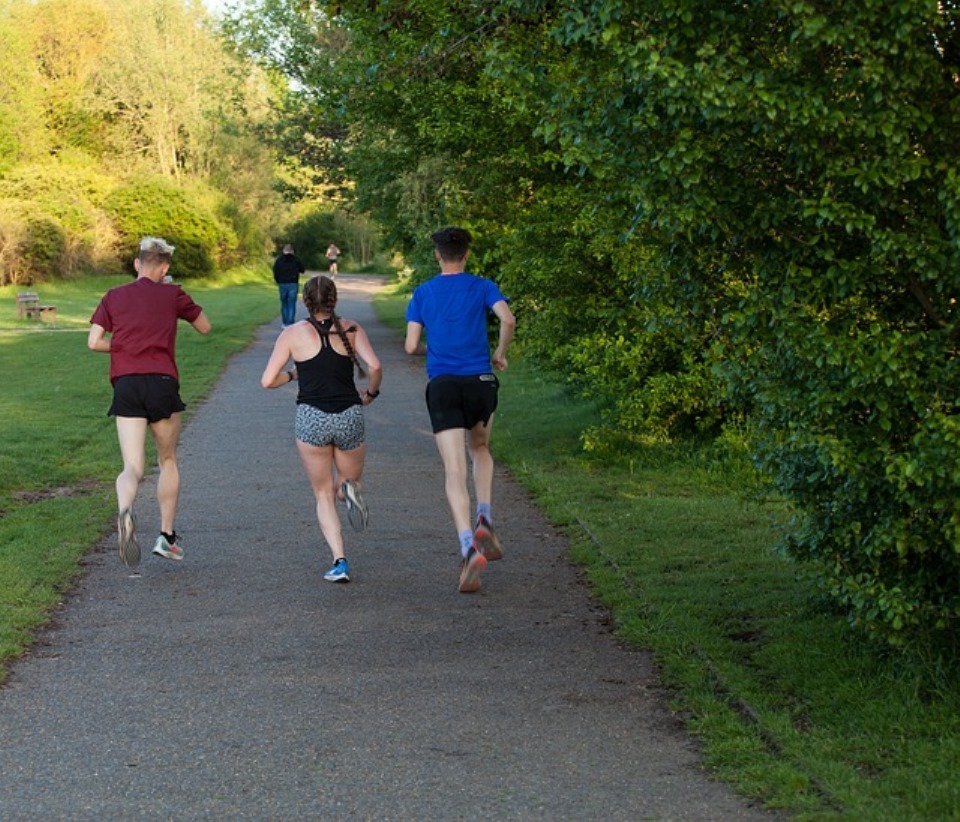
What will you do next year? Most probably, I will learn Spanish with P2T. – ¿Qué harás el próximo año? Probablemente, (yo) aprenderé español con P2T.
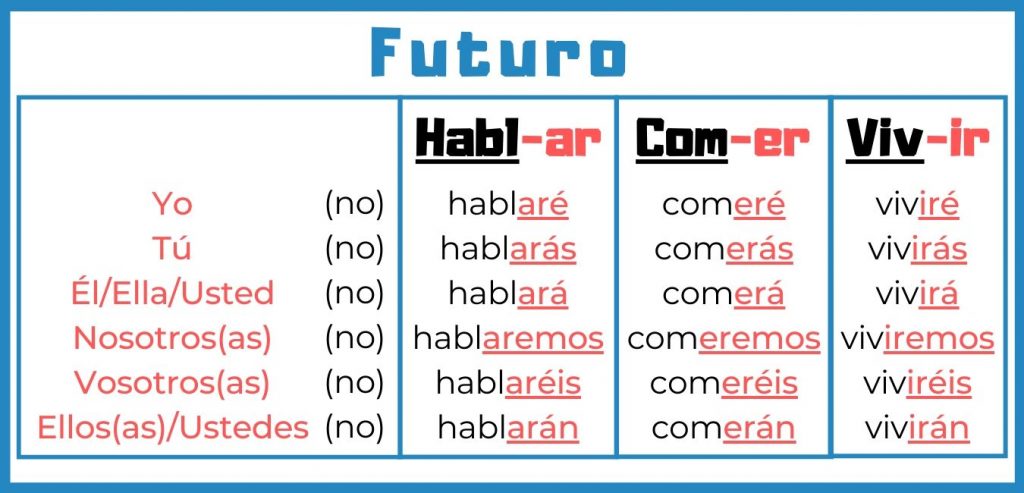
We use the “Simple Future Tense” when we are not totally sure that something will happen, that is, there is a 50% probability that the event “will or shall” happen. – Usamos el “Futuro” para expresar acciones que puede que sucedan o puede que no (50% de probabilidad); es decir, no estamos totalmente seguros de que algo vaya a suceder.
A VIDEO WILL COME SOON: If the videos are too quick for you, use the playback speed and captions buttons for slow motion and subtitles. It is advisable that you listen to Spanish people talking. If you are a complete beginner, join our Spanish Lessons and contact Susana for more information +34 661 74 36 45.
1. Conjugación – Conjugation, how do we form it?
1.1. Verbos regulares – Regular verbs
To conjugate a verb in Simple Future, remove the infinitive ending (-ar, -er, -ir) and add the ending that matches the subject from the table below. – Se forma con la raíz del verbo (quitando las dos últimas letras) y añadiendo las terminaciones de futuro.
INFINITIVE=STEM (To speak)+ending / INFINITIVO=RAIZ (HABLAR=HABL+ar)+terminación
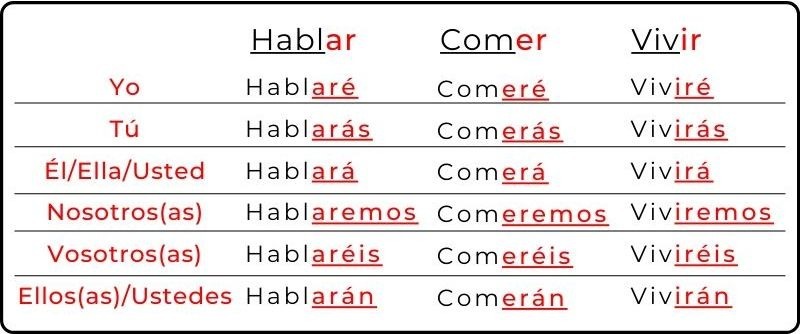
Note: If we use the infinitive instead of the stem, all verb conjugations (-ar, -er, and -ir) have the same endings in the simple future tense: -é, -ás, -á, -emos, -éis, -án. – Si consideramos el infinitivo en vez de la raíz, todas las conjugaciones (-ar, -er, and -ir) tienen las mismas terminaciones: -é, -ás, -á, -emos, -éis, -án.
1.2. Verbos irregulares – Irregular verbs
Groups based on phonetics – Agrupados por fonética:
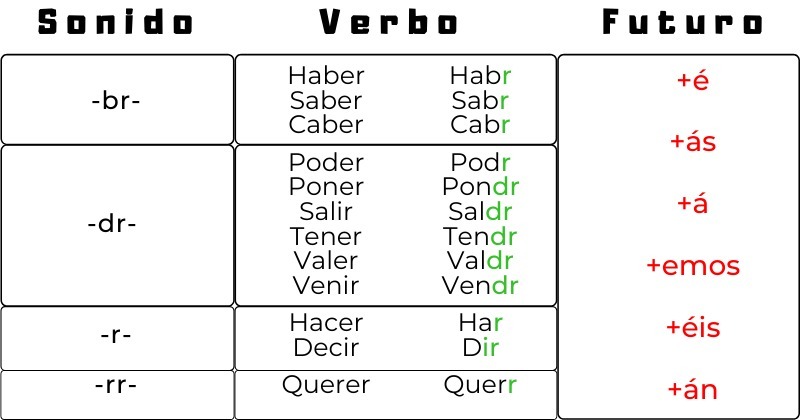
Groups based on spelling changes – Agrupados por cambios consonánticos:
Raiz+r+terminaciones: Hab+r-é, sab+r+é, cab+r+é, pod+r-é, quer+r-é
Raiz+dr+terminaciones: pon+dr-é, sal+dr-é, ten+dr-e, val+dr-é, ven+dr-é
Nueva raiz+r+terminaciones : Ha+r-é, Di+r-é
2. Usos – when do we use it?
While the simplest future is most often used to talk about what a person will do, it can also be used to talk about conjecture, possibilities, and probabilities in the present, make predictions about the future, and give solemn commands. – Si bien el futuro más simple se usa con mayor frecuencia para hablar sobre lo que hará una persona, también se puede usar para hablar sobre conjeturas, posibilidades y probabilidades en el presente, hacer predicciones sobre el futuro y dar órdenes solemnes.
2.1. Far future, we can’t do anything about it. Facts – Futuro lejano, no podemos cambiarlo. Hechos:
Mi padre no tiene mucho pelo. Se quedará calvo pronto.
My father hasn’t got much hair. He will go bald soon.
2.2. Personal opinions about the future. – Opiniones personales sobre el futuro:
María y Pedro se casaron el año pasado. Cuando hayan ahorrado un poco de dinero, se comprarán una casa nueva.
Maria and Pedro got married last year. When they have saved some money, they will buy a new house.
2.3. Predictions without firm evidence. – Predicciones sin evidencia clara:
Dentro de 150 años, los hombres serán calvos.
In 150 years, men will be likely (to go) bald.
Note: There is a 50% chance that this will happen. – Nota: La probabilidad de que este hecho suceda es del 50%
2.4. Spontaneous decisions (while speaking) – Decisiones espontáneas tomadas mientras se habla.
¿A qué hora vais a quedar? No lo sé. Supongo que quedaremos sobre las 10.
What time are you all meeting? I don’t know. I guess we will meet at about 10 pm.
Note: We normally ask with (to be going to) future, because we are asking for the plans someone has. – Nota: Solemos hacer la pregunta en futuro próximo (ir a…).
2.5. First conditional (If+present, simple future) – Condicional uno (Si+presente, futuro).
Si crees que aprobarás el test, lo conseguirás.
If you believe that you will pass the test, you will get it.
2.6. Request, wishes, promises, hopes, threats, religious threats. – Peticiones, deseos, promesas, esperanzas, amenazas, culto.
No me llames esta tarde/noche; supongo que estaré estudiando para mi examen de español.
Don’t phone me this evening; I guess I will be studying for my Spanish exam.
*El año próximo iré a París.
Pronto saldremos de casa y quedaremos con nuestros amigos para tomar algo en un bar.
Te llamaré mañana.
Os veré la próxima semana.
Juro que la/lo mataré.
No robarás.
*2.6 Translate these sentences and leave your answers in the REPLY BOX
2.7. Surprise – Sorpresa con un significado de presente
Alguien te da un susto y tú gritas: ¡Serás tonto!
Someone scares you and you yell/shout: You are stupid!
2.8. Probability or polemic – Probabilidad o polémica en el momento actual.
¿Qué hora es? Serán las 2. (Cuando no tienes reloj e intentas adivinar la hora = Quizás sean las 2 o quizás no)
What time is it? It is about 2 o’clock (when you do not have a clock and you try to guess the time = Maybe it will be 2 o’clock or maybe not)
3. DIFERENCIAS CON EL INGLÉS – DIFFERENCES WITH ENGLISH
3.1. Simple present may be used too:
In Spanish simple present MAY BE used instead of simple future/present continuous/going to talk about future events that are certain (fixed arrangements). – En español, se puede usar el presente simple para hablar de eventos en el futuro que ya han sido organizados (1. Present / Uses 2.8: To express fixed arrangements, present or future).
Te veo mañana en el hospital. Te veré mañana ….
I’ll see you tomorrow at the hospital.
Me caso el 6 de mayo. Me casaré el 6 de mayo si todo va bien.
I am getting married on May, the 6th.
Mis padres vienen a verme mañana. Mis padres vendrán a verme mañana.
My parents are going to visit me tomorrow.
3.2 We DO NOT USE SIMPLE FUTURE instead will use present of subjunctive with these signal words:
In Spanish present of subjuntive is used instead of simple future after these signal words: probably, maybe, perhaps, likely, I expect, I hope, I wish, I don’t believe.. – En español, después de estas palabras usamos el presente de subjuntivo en vez del futuro simple: probablemente, tal vez, quizás, esprobable que, espero que, deseo que, no creo que…
*Probablemente vayamos al cine a la sesión de las ocho. (Probably)
Tal vez vaya a la fiesta de Juan, si me siento mejor. (Maybe)
Quizás, en el futuro, trabajemos desde casa. (Perhaps) Es probable que los coches sean solares en el futuro. (Likely)
Espero que me llames pronto. (I expect)
Espero que el confinamiento termine pronto. (I hope)
Deseo que vengas a verme el próximo fin de semana. (I wish…)
No creo que tengamos vacaciones este verano. (I don’t believe…)
*3.2 Translate these sentences and leave your answers in the REPLY BOX
4. Marcadores temporales y expresiones para dar opinión – time and opinion expressions
-A moment in the far future: One day, in future, in 2050, etc… – Momento en el futuro lejano: un día, en el futuro, en 2050…
*Un día viajaremos a la luna. (One day)
En el futuro viviremos en capsulas. (In future)
En 2050 seremos muy inteligentes. (In 2050)
-A moment in the near future when we give a spontaneous answer: Tomorrow, next week, next month/year, within one hour … I don’t know, I guess… – Momento en un futuro cercano cuando damos una respuesta espontánea en el momento en el que hablamos: Mañana, la próxima semana, el próximo mes/año, en una hora….No sé, supongo que…
*No sé qué haré mañana. (Tomorrow)
Supongo que iremos a la playa la próxima semana (Next week)
– To give our opinion: I think, I believe, in my opinion, I’m sure, I’m afraid, I promise – Para dar nuestra opinión usamos frases tales como: (Yo) pienso que, (yo) creo que, en mi opinión, (yo) estoy seguro de que, me temo que, (yo) prometo que…
*Yo pienso que en 2050 estaremos todos muy delgados. (I think)
Yo creo que tendremos vacaciones en verano. (I believe)
En mi opinión será divertido quedar el domingo. (In my opinion)
Estoy seguro de que aprenderemos mucho español este año. (I’m sure)
Me temo que el paro aumentará. (I’m afraid)
Prometo que iré a verte el próximo mes. (I promise)
*4 Translate these sentences and leave your answers in the REPLY BOX
5. Ejercicios – Exercises
At the end of the page there is a LEAVE A REPLY section to send us your answers to this exercise. Ask and answer questions similar to the examples for each one of the photos. *Note: there is a list of verbs under the pictures. – Al final de la página hay un apartado para enviarnos tus respuestas a este ejercicio “LEAVE A REPLY”. Pregunta y responde a preguntas similares a los ejemplospara cada una de las fotografías. *Nota: hay un listado de verbos a continuación de las fotos.
- ¿Qué hará (él/ella) cuando crezca? Él/ella … porque/para (motivo)…. O con (persona)…
- Si hace sol, ¿qué harán (ellos/ellas) este fin de semana? Ellos/ellas…. en Murcia/por la playa (lugar)…
- What will he/she do when she will grow up? He/she will…because (reason)…OR with (person)..
- If it is sunny, what will they do this weekend? They will… in….
The following verbs can help you complete the sentences: TO… play chess / smoke / eat / walk / run / climb / listen to music / sleep / ride a bicycle-cycle / cook / drive / read – Los siguientes verbos te pueden ayudar a completar las frases: jugar al ajedrez / fumar / comer / pasear / correr / escalar / escuchar música / dormir / montar en bici-hacer ciclismo / cocinar-preparar la cena / conducir / leer
- Si mañana hace sol, ellos …..
- Si el fin de semana hace bueno, él …
- Si la próxima semana llueve, ellos ……..
- Si llueve, él ……….
- Cuando crezca, ella comerá más verduras y menos pasta para no engordar
- Cuando tenga 20 años, ella ….
- Si el domingo no llueve, ellos ….
- Cuando sea mayor, ella ….
- Si el tiempo lo permite, ellos ….
- A partir de los 15 años, ella ….
- Cuando deje de ser adolescente, ella ….
- Si mañana hace un buen día, ellos ….
Note: Presente: Si hace sol – If it is sunny,… / Presente de subjuntivo: Cuando crezca – When she grows up…
And remember!! Practice makes perfect
Come to practise with Spanish native speakers in our >> Off The Cuff Talks! << be brave and ask them ¿Qué estás haciendo?
Did you find it useful? Then, please… FEEL FREE TO SHARE IT!
Do you have any doubts or even a contribution? Please fill out the form at the bottom, and we will get back to you asap⏬
Join our Spanish lessons in Torre de la Horadada, San Javier, Mar Menor Golf Resort and Sucina (Casas Blancas)
This is just a small example of what you can learn. Get the support of the best Spanish Tutor in the area, Susana Romero, and enjoy learning Conversational Spanish.







